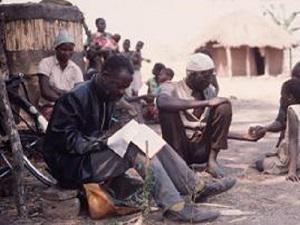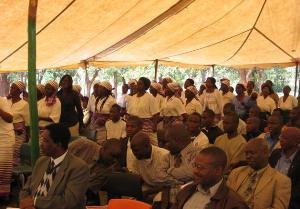Elija Kamundi
Other projects
27 Oct 2010
Sustainable Utilisation and Conservation of Medicinal Plants that are Used for Treating HIV and AIDS Related Infections in Malawi - Scaling Up Project
The main objective of the project is to reduce overexploitation of medicinal plants that are used for treating HIV and AIDS related illnesses in Malawi.

Leader of Sinyala VFM Committee member during needs assessment.
Harvesting and utilization of medicinal plants in Malawi is engrained in the peoples’ culture but management of the resources has to be learnt. The event of HIV and AIDS in Malawi and other Sub-Saharan Africa has accelerated exploitation of medicinal plants which are believed to cure opportunistic diseases like shingles, sores, rashes, tuberculosis, pneumonia, diarrhoea and all other AIDS related illnesses. More than fourteen medicinal species have become increasingly difficult to source in the last five years, and the most affected species include Azanza garkeana, Pterocarpus angolensis, Flacourtia indica, Markhamia acuminata, Burkea africana, Erythrina abyssinica, Faidherbia albida, Afzelia quanzensis, Pseudolachnostylis maprouneifolia, Antidesma vernosum, Cassia abbreviata. The less educated and poor communities are the major culprits who depend most on these species because of two major reasons. The first reason is that most communities in Africa as a whole have strong belief that all diseases and other disorders are caused by a spell from witches and that they can only be combated by traditional medicines and not conventional medicines. Another problem, which promotes the use of traditional medicines, is that the majority of the infected people are poor, and they cannot afford anti-retroviral (ARV) medicines, which cost more than 20 US Dollars per month in Malawi.

Project launch.
To date, there is no intervention to deal with this problem in Malawi and other Sub-Saharan Africa mainly because scientists regard traditional healers as primitive and not worth to be partners. On the other hand, traditional healers themselves are very secretive on the type of plants that they use for fear reducing their market and fame. This project will focus on building local human capacity in different aspects of sustainable forestry management which include, participatory forestry monitoring and evaluation, basic ecology of different medicinal plants, propagation techniques for different medicinal plants, nursery establishment and management, homestead cultivation, leadership, sustainable harvesting techniques and conflict management skills for leaders of Village Forest Management Committee Members and establishment of local by-laws. A total of ten Village Forest Management Committees (VFMCs) and 60 herbalists have been selected as initial beneficiaries of the project. In total, 2000 households will benefit from improved management of medicinal plants and economic gains that will accrue from sells of medicines and fees charges from collection of medicines from their forests and gardens.